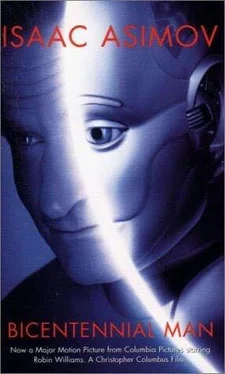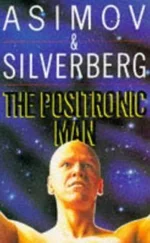Isaac Asimov - The Bicentennial Man and Other Stories
Здесь есть возможность читать онлайн «Isaac Asimov - The Bicentennial Man and Other Stories» весь текст электронной книги совершенно бесплатно (целиком полную версию без сокращений). В некоторых случаях можно слушать аудио, скачать через торрент в формате fb2 и присутствует краткое содержание. Год выпуска: 1976, ISBN: 1976, Издательство: Doubleday science fiction, Жанр: Фантастика и фэнтези, на английском языке. Описание произведения, (предисловие) а так же отзывы посетителей доступны на портале библиотеки ЛибКат.
- Название:The Bicentennial Man and Other Stories
- Автор:
- Издательство:Doubleday science fiction
- Жанр:
- Год:1976
- ISBN:ISBN: 0-385-12198-9
- Рейтинг книги:4 / 5. Голосов: 1
-
Избранное:Добавить в избранное
- Отзывы:
-
Ваша оценка:
- 80
- 1
- 2
- 3
- 4
- 5
The Bicentennial Man and Other Stories: краткое содержание, описание и аннотация
Предлагаем к чтению аннотацию, описание, краткое содержание или предисловие (зависит от того, что написал сам автор книги «The Bicentennial Man and Other Stories»). Если вы не нашли необходимую информацию о книге — напишите в комментариях, мы постараемся отыскать её.
The Bicentennial Man and Other Stories — читать онлайн бесплатно полную книгу (весь текст) целиком
Ниже представлен текст книги, разбитый по страницам. Система сохранения места последней прочитанной страницы, позволяет с удобством читать онлайн бесплатно книгу «The Bicentennial Man and Other Stories», без необходимости каждый раз заново искать на чём Вы остановились. Поставьте закладку, и сможете в любой момент перейти на страницу, на которой закончили чтение.
Интервал:
Закладка:
Of course, the resolutions are completely different, and it was in my mind to demonstrate some of the changes in our outlook on the Universe that took place in those thirty-seven years by producing in 1976 a resolution that would have been inconceivable in 1939.
In the fall of 1975, Fred Dannay (better known as Ellery Queen) approached me with a very intriguing idea for the August 1976 issue of Ellery Queen’s Mystery Magazine, which would be on the stands at the time of the Bicentennial. He planned to publish a mystery dealing with the Bicentennial itself, and another dealing with the Centennial in 1876. What he needed now was one for the Tricentennial in 2076 and, of course, that meant a science fiction story.
Since I have been writing numerous mystery stories for the magazine in recent years, he thought of me and proposed that I tackle the job. I agreed and got to work on November 1, 1975. I ended with uncompromising science fiction which I feared might make a little heavy going for mystery readers. Fred thought otherwise, apparently, for he took the story and was even kind enough to pay me a bonus.
The Tercentenary Incident
July 4, 2076—and for the third time the accident of the conventional system of numeration, based on powers of ten, had brought the last two digits of the year back to the fateful 76 that had seen the birth of the nation.
It was no longer a nation in the old sense; it was rather a geographic expression; part of a greater whole that made up the Federation of all of humanity on Earth, together with its offshoots on the Moon and in the space colonies. By culture and heritage, however, the name and the idea lived on, and that portion of the planet signified by the old name was still the most prosperous and advanced region of the world. . . . And the President of the United States was still the most powerful single figure in the Planetary Council.
Lawrence Edwards watched the small figure of the President from his height of two hundred feet. He drifted lazily above the crowd, his flotron motor making a barely heard chuckle on his back, and what he saw looked exactly like what anyone would see on a holovision scene. How many times had he seen little figures like that in his living room, little figures in a cube of sunlight, looking as real as though they were living homunculi, except that you could put your hand through them.
You couldn’t put your hand through those spreading out in their tens of thousands over the open spaces surrounding the Washington Monument. And you couldn’t put your hand through the President. You could reach out to him instead, touch him, and shake his hand.
Edwards thought sardonically of the uselessness of that added element of tangibility and wished himself a hundred miles away, floating in air over some isolated wilderness, instead of here where he had to watch for any sign of disorder. There wouldn’t be any necessity for his being here but for the mythology of the value of “pressing the flesh.”
Edwards was not an admirer of the President—Hugo Allen Winkler, fifty-seventh of the line.
To Edwards, President Winkler seemed an empty man, a charmer, a vote grabber, a promiser. He was a disappointing man to have in office now after all the hopes of those first months of his administration. The World Federation was in danger of breaking up long before its job had been completed and Winkler could do nothing about it. One needed a strong hand now, not a glad hand; a hard voice, not a honey voice.
There he was now, shaking hands—a space forced around him by the Service, with Edwards himself, plus a few others of the Service, watching from above.
The President would be running for re-election certainly, and there seemed a good chance he might be defeated. That would just make things worse, since the opposition party was dedicated to the destruction of the Federation.
Edwards sighed. It would be a miserable four years coming up—maybe a miserable forty—and all he could do was float in the air, ready to reach every Service agent on the ground by laser-phone if there was the slightest—
He didn’t see the slightest. There was no sign of disturbance. Just a little puff of white dust, hardly visible; just a momentary glitter in the sunlight, up and away, gone as soon as he was aware of it.
Where was the President? He had lost sight of him in the dust. He looked about in the vicinity of where he had seen him last. The President could not have moved far.
Then he became aware of disturbance. First it was among the Service agents themselves, who seemed to have gone off their heads and to be moving this way and that jerkily. Then those among the crowd near them caught the contagion and then those farther off. The noise rose and became a thunder.
Edwards didn’t have to hear the words that made up the rising roar. It seemed to carry the news to him by nothing more than its mass clamorous urgency. President Winkler had disappeared! He had been there one moment and had turned into a handful of vanishing dust the next.
Edwards held his breath in an agony of waiting during what seemed a drug-ridden eternity, for the long moment of realization to end and for the mob to break into a mad, rioting stampede.
—When a resonant voice sounded over the gathering din, and at its sound, the noise faded, died, and became a silence. It was as though it were all a holovision program after all and someone had turned the sound down and out.
Edwards thought: My God, it’s the President. There was no mistaking the voice. Winkler stood on the guarded stage from which he was to give his Tercentenary speech, and from which he had left but ten minutes ago to shake hands with some in the crowd.
How had he gotten back there? Edwards listened—
“Nothing has happened to me, my fellow Americans. What you have seen just now was the breakdown of a mechanical device. It was not your President, so let us not allow a mechanical failure to dampen the celebration of the happiest day the world has yet seen. . . . My fellow Americans, give me your attention—”
And what followed was the Tercentenary speech, the greatest speech Winkler had ever made, or Edwards had ever heard. Edwards found himself forgetting his supervisory job in his eagerness to listen.
Winkler had it right! He understood the importance of the Federation and he was getting it across.
Deep inside, though, another part of him was remembering the persistent rumors that the new expertise in robotics had resulted in the construction of a look-alike President, a robot who could perform the purely ceremonial functions, who could shake hands with the crowd, who could be neither bored nor exhausted—nor assassinated.
Edwards thought, in obscure shock, that that was how it had happened. There had been such a look-alike robot indeed, and in a way—it had been assassinated.
October 13, 2078
Edwards looked up as the waist-high robot guide approached and said mellifluously, “Mr. Janek will see you now.”
Edwards stood up, feeling tall as he towered above the stubby, metallic guide. He did not feel young, however. His face had gathered lines in the last two years or so and he was aware of it.
He followed the guide into a surprisingly small room, where, behind a surprisingly small desk, there sat Francis Janek, a slightly paunchy and incongruously young-looking man.
Janek smiled and his eyes were friendly as he rose to shake hands. “Mr. Edwards.”
Edwards muttered, “I’m glad to have the opportunity, sir—” Edwards had never seen Janek before, but then the job of personal secretary to the President is a quiet one and makes little news.
Janek said, “Sit down. Sit down. Would you care for a soya stick?”
Edwards smiled a polite negative, and sat down. Janek was clearly emphasizing his youth. His ruffied shirt was open and the hairs on his chest had been dyed a subdued but definite violet.
Читать дальшеИнтервал:
Закладка:
Похожие книги на «The Bicentennial Man and Other Stories»
Представляем Вашему вниманию похожие книги на «The Bicentennial Man and Other Stories» списком для выбора. Мы отобрали схожую по названию и смыслу литературу в надежде предоставить читателям больше вариантов отыскать новые, интересные, ещё непрочитанные произведения.
Обсуждение, отзывы о книге «The Bicentennial Man and Other Stories» и просто собственные мнения читателей. Оставьте ваши комментарии, напишите, что Вы думаете о произведении, его смысле или главных героях. Укажите что конкретно понравилось, а что нет, и почему Вы так считаете.












